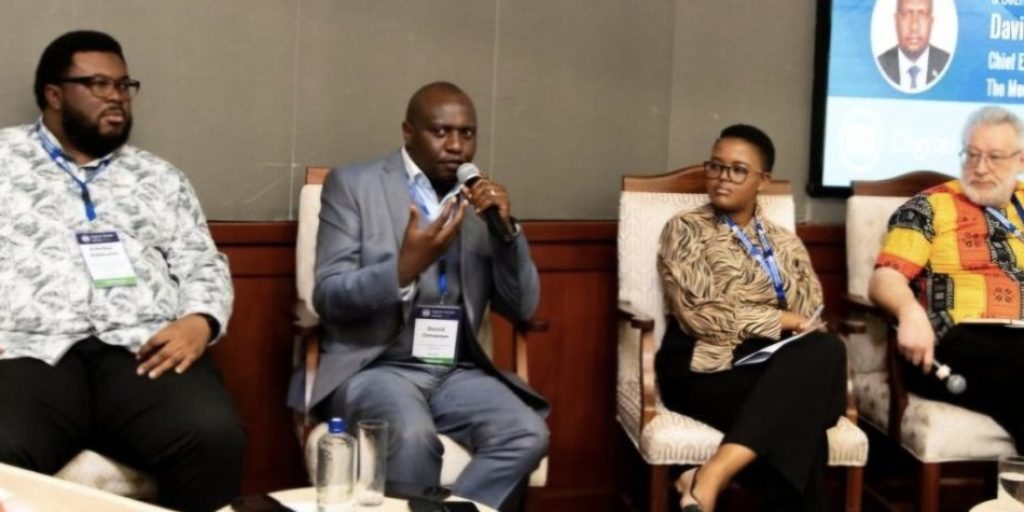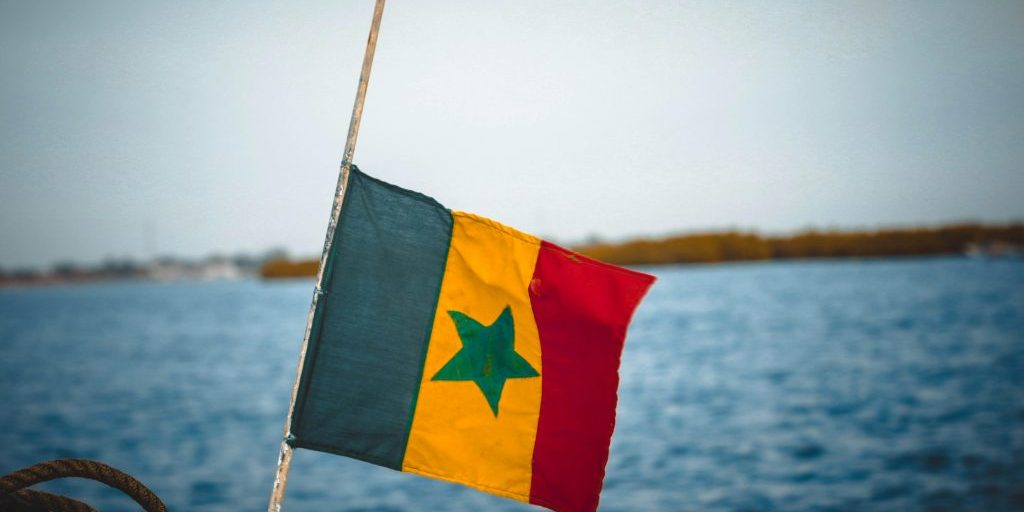Proposed reforms aim for Big Tech to share online revenue with Kenyan media
PICTURE: Media Council of Kenya (MCK) CEO David Omwoyo speaks on the need for media regulation to uphold journalistic integrity, protect public interest, and ensure press freedom. Member of the Press Council of South Africa Izak Minnaar is seated on the far right. Photo courtesy MCK
Journalism Hub East Africa
Traditional media – especially print and broadcast – has struggled to adapt as audiences increasingly turn to online sources for news and entertainment.
The explosion of smartphones and affordable Internet access has resulted in declining newspaper circulation and TV viewership. Media observers warn that this trend has put the long-term survival of traditional media outlets at risk.
This digital disruption has eroded advertising revenues, a once-stable financial pillar for media houses, as advertisers increasingly shift their budgets to global platforms like Facebook and Google. The visible consequences have been job losses – politely referred to in Kenya as ‘media restructuring’ – closures of media outlets and a noticeable decline in investigative journalism.
This decline has also led to a credibility crisis within the media industry, as public concern grows over the spread of ‘fake news’ and misinformation.
Politically aligned media houses have further worsened the situation, prompting the need for a strong regulatory framework to restore trust in the Kenyan media.
In response to these challenges, a report by the Information, Communications, and Digital Economy Sector Working Group (SWG) has proposed a radical new regulatory framework to address long-standing issues.
The SWG has recommended a shift from the traditional co-regulation model where the industry and government regulate together – to a hybrid regulatory approach that blends self-regulation, public accountability and educational initiatives
This model, known as ‘decentred regulation’, reflects a broader shift toward adapting regulatory approaches to modern media realities while maintaining core principles of independence and accountability.
The proposed framework seeks to regulate the media industry more dynamically, with a focus on emerging issues such as digital platforms, data governance and online content moderation.
Central to this framework is a bold proposal for digital taxation on global platforms that benefit Kenyan audiences (reference is made here to Canada, where Google pulled its Google News service in response to the Canadian Online News Act, which requires Big Tech giants to pay news publishers for news content published on their platforms).
This taxation seeks to ensure these companies contribute to the local media ecosystem and support sustainable journalism.
Alongside this, the establishment of content moderation standards is designed to combat misinformation and uphold ethical journalism, empowering digital content creators and strengthening the integrity of Kenya’s media landscape.
Public accountability is another key element, as the proposal suggests establishing a media Ombudsman to allow citizens to participate in media oversight through feedback channels and reporting mechanisms for unethical practices.
To further empower audiences, the framework promotes media literacy programmes to improve public understanding of media consumption, enabling citizens to critically evaluate news sources and combat misinformation.
In developing this proposal, the SWG benchmarked media regulation practices from South Africa, the United Kingdom and Canada.
South Africa’s regulatory framework, anchored in its Constitution, features an independent authority (ICASA) that oversees broadcasting free from political and commercial influence, supported by industry-led bodies like the Press Council. In the UK, Ofcom provides statutory regulation, while a strong tradition of self-regulation maintains content standards and independence from political control.
Canada’s system, regulated by the Canadian Radio, Television and Telecommunications (Commission), promotes national values and diversity, while self-regulatory bodies and privacy laws ensure ethical standards. Each model emphasises independence, adaptability and a balanced approach to digital media challenges, offering valuable lessons for Kenya’s evolving media landscape.
As part of the proposed reforms, the SWG also recommends re-establishing the Kenya (Institute) of Mass Communication through an Act of Parliament. Currently constrained by outdated legal frameworks, the KIMC lacks the necessary authority to secure funding and build partnerships.
The new Act would grant the KIMC full autonomy, positioning it as a premier institution for public communication training in Kenya and the region. This change would enable the KIMC to align its training with national strategies and modern technology, as well as introduce professional content creation courses to support the evolving media landscape.
Re-establishing the KIMC will enable it to assume training responsibilities from the Media Council of Kenya (MCK), enhancing its role in developing specialised media programmes.
Additionally, the SWG calls for amendments to various Kenyan laws to align them with constitutional provisions on media freedom and expression. These proposed changes seek to create a more open and flexible environment for both traditional and digital media practitioners.
According to the SWG, this shift reflects the need for a system that is both flexible and resilient, moving beyond rigid, top-down approaches to embrace more decentralised governance.
The core principle remains: preserving the independence of media regulation is paramount, as impartial oversight is essential in a world where information equates to power, the report says.
A key part of this is fostering inter-agency collaboration among regulatory bodies, media organisations, and civil society, with the goal of building a cohesive and adaptable regulatory framework.
The current regulatory structure is anchored in the Constitution of Kenya 2010 and includes the Kenya Information and Communications Act (KICA), the Media Council Act and the Kenya Broadcasting Corporation (KBC) Act.
While these laws have shaped the media industry, they have faced criticism for their effectiveness and impartiality. For example, the KICA established the Communications Authority of Kenya (CAK), but it grants the Minister significant power to issue policy guidelines, raising concerns about potential external influence on CAK’s independence.
Government influence, particularly in the appointment processes, poses a significant risk of exposing these bodies to political pressures. Such interference undermines the independence of the regulators, compromising their ability to make impartial and effective decisions in overseeing media and communication sectors
Political interference further complicates the regulatory environment; as political appointees may face pressure to align their decisions with government agendas. This risks eroding the impartiality that is crucial for fair and effective regulation.
One example that highlights the vulnerability of these regulatory bodies to political influence, is the appointment of David Mugonyi as Director General of CAK in December 2023. Mugonyi’s prior role as the Head of the Presidential Communications Service in the current government raised concerns about possible political interference in CAK’s operations.
To address these challenges, the SWG proposes stronger legal safeguards to insulate regulators from undue influence and ensure their effectiveness. The lack of transparency in the appointment processes and close ties between regulators and media owners also contribute to perceptions of favoritism, which erodes public trust.
Similar concerns exist regarding the MCK, as its board appointments have been mired in political interference, undermining its ability to function impartially. Although the appointment process for MCK board members is designed to be transparent – featuring a selection panel nominated by 13 stakeholders and supported by the Cabinet Secretary – the reality has been marred by interference from the line ministry’s previous Cabinet Secretaries.
Their interference caused a protracted court battle, resulting in the MCK being left without a functioning board, and the selection process is now caught up in additional legal disputes.
Critics further argue that the lack of transparency in sharing exit reports from the outgoing Board and the Complaints Commission undermines the effectiveness of the Selection Panels, inhibiting their understanding of past challenges and perpetuating ineffective governance in the media landscape.
The KBC Act designates KBC as a State corporation with a mandate to provide diverse content and promote cultural values. However, the Act’s provisions regarding the appointment of the Managing Director and Board are vague, a concern that could affect perceptions of KBC’s independence.
Detailed regulations or guidelines are necessary to ensure that appointments are made transparently and with due regard for impartiality, the report recommends. The report further warns that the absence of clear protection mechanisms exposes regulators to external pressures, compromising their effectiveness.
The SWG also proposed important amendments to various Kenyan laws to ensure alignment with constitutional provisions on media freedom and expression. These changes aim to reshape the media environment, enabling both traditional and new media practitioners to operate without unnecessary restrictions.
A key focus of these recommendations is the amendment of 13 key laws that currently hinder media freedom, including the National Police Service Act, the Prevention of Terrorism Act and the Kenya Defense Forces Act.
Provisions in these laws are viewed as inconsistent with constitutional articles that safeguard journalists from undue interference and censorship.
The SWG task force also suggested a review of the Computer Misuse and Cybercrimes Act of 2018, which has faced criticism for targeting journalists and online content creators. Other laws identified for reform include the Official Secrets Act, the Penal Code and the Defamation Act, which have been used to stifle investigative journalism and critical reporting.
‘The Constitution is clear on the right to freedom of the press and expression,’ the report emphasises, highlighting that all laws must uphold this commitment to protect journalists from harassment and legal threats. In addition to these legal reforms, the SWG recommends granting greater independence to the Kenya Yearbook Editorial Board, enabling it to secure funding and access data from public institutions.
With the emergence of New Media, the SWG also proposed transforming the Bloggers Association of Kenya into an Association of Content Creators, which would focus on training and accreditation to improve the quality of content produced on platforms like YouTube and TikTok.
The report concludes that reforms in Kenya’s media landscape must focus on preserving the independence of regulatory bodies, improving transparency in decision-making, and ensuring financial independence from government reliance.
These measures will help create a more resilient and trustworthy media environment, capable of navigating the challenges of the digital age.
- Read this article on the Journalism Hub East Africa website here.
- The Hub is aimed at encouraging fact-based and impartial reporting on good governance and corruption in Kenya. It points to original sources, provides reporting ideas and gives hints on how to follow-up on specific stories that are in the news. The site was developed through the support of DW Akademie training




